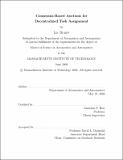Consensus-based auctions for decentralized task assignment
Author(s)
Brunet, Luc (Luc P. V.)
DownloadFull printable version (2.478Mb)
Other Contributors
Massachusetts Institute of Technology. Dept. of Aeronautics and Astronautics.
Advisor
Jonathan P. How.
Terms of use
Metadata
Show full item recordAbstract
This thesis addresses the decentralized task assignment problem in cooperative autonomous search and track missions by presenting the Consensus-Based class of assignment algorithms. These algorithm make use of information consensus routines to converge on the assignment rather than the situational awareness of the fleet. A market-based approach is used as the mechanism for task selection, while the novel consensus stage of the algorithms allow for fast distributed conflict resolution. Three separate algorithms belonging to the Consensus-Based class of assignment strategies will be presented. The first is the Consensus-Based Auction Algorithm (CBAA), which is a single assignment auction strategy that is shown to be bounded within 50% of the optimal solution, while an upper-bound on convergence is presented. Two multi-assignment algorithms are then presented as extensions of the CBAA. The iterative CBAA executes the single assignment algorithm multiple times in order to build an assignment with multiple tasks. The second algorithm is the more general Consensus-Based Bundle Algorithm (CBBA) in which agents build a candidate bundle of tasks and bid on each task individually based on the improvement in score achieved by adding it to the bundle. Both algorithms are shown to be lower bounded by 50% optimality, while convergence bounds are derived based on the network topology. Numerical results show that the bundle algorithm performs much better than the iterative approach while providing faster convergence times. It is also compared with the Prim Allocation (PA) auction algorithm where it is shown to exhibit much faster convergence times and give better assignments. The CBBA is also implemented in the CSAT simulation test-bed developed by Aurora Flight Sciences in conjunction with MIT, and shown to produce faster response times and better tracking performance than the currently used RDTA algorithm.
Description
Thesis (S.M.)--Massachusetts Institute of Technology, Dept. of Aeronautics and Astronautics, 2008. This electronic version was submitted by the student author. The certified thesis is available in the Institute Archives and Special Collections. Includes bibliographical references (p. 137-147).
Date issued
2008Department
Massachusetts Institute of Technology. Department of Aeronautics and AstronauticsPublisher
Massachusetts Institute of Technology
Keywords
Aeronautics and Astronautics.